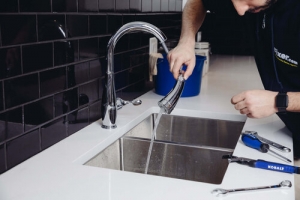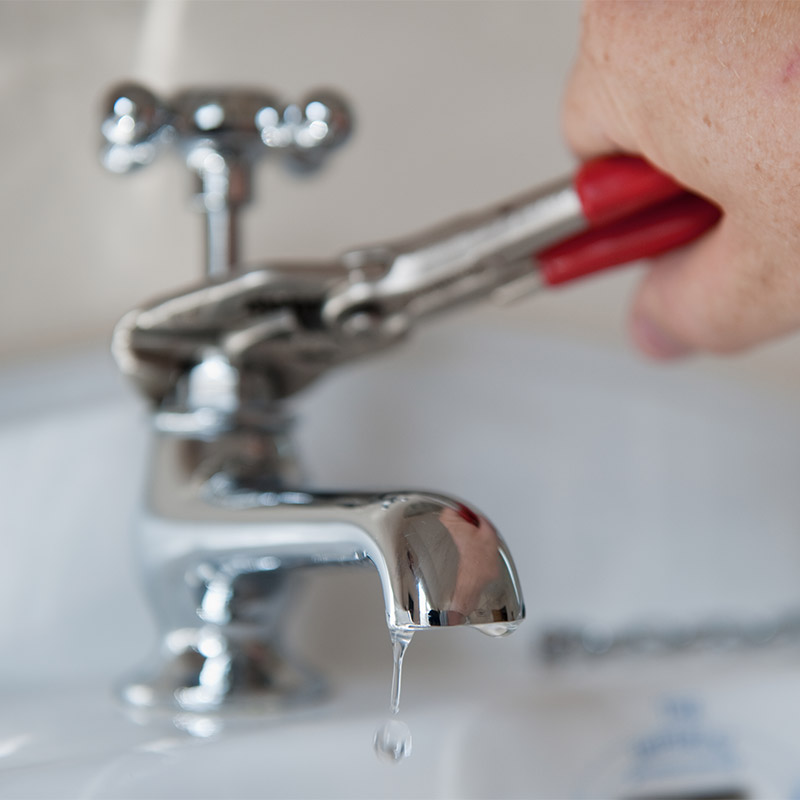What are your insights and beliefs on Should I Repair or Replace a Leaky Faucet??

Dripping faucets could feel like a small hassle, however their effect surpasses just the aggravation of the sound. From wasting water to incurring unneeded monetary prices and health and wellness dangers, overlooking a trickling tap can cause various consequences. In this article, we'll delve into why it's critical to address this typical home issue promptly and efficiently.
Waste of Water
Ecological Influence
Leaking taps add substantially to water waste. According to the Epa (EPA), a single faucet trickling at one drip per second can waste greater than 3,000 gallons of water per year. This not just strains water resources yet likewise influences ecosystems and wild animals depending on them.
Step-by-Step Guide to Fixing a Dripping Tap
Devices Called for
Before attempting to deal with a trickling tap, gather the required tools, consisting of an adjustable wrench, screwdrivers, replacement components (such as washing machines or cartridges), and plumber's tape.
Typical Tap Issues and Their Solutions
Determine the kind of faucet and the particular issue causing the drip. Usual issues include damaged washers, rusty valve seats, or faulty O-rings. Describe maker instructions or on-line tutorials for detailed support on repair work.
Financial Costs
Raised Water Bills
Beyond the ecological influence, dripping faucets can inflate water bills significantly. The collected wastage over time converts right into greater energy expenditures, which could have been avoided with timely fixings.
Possible Residential Or Commercial Property Damage
Furthermore, extended leaking can result in damage to fixtures and surfaces bordering the tap. Water buildup can create staining, rust, and even architectural issues if left ignored, resulting in additional repair costs.
Health and wellness Problems
Mold And Mildew and Mold Growth
The continuous existence of dampness from a trickling tap creates an optimal atmosphere for mold and mold development. These fungis not only compromise indoor air top quality however likewise pose wellness threats, especially for individuals with respiratory system problems or allergies.
Waterborne Illness
Stationary water in leaking taps can end up being a breeding place for bacteria and other microorganisms, raising the danger of waterborne conditions. Pollutants such as Legionella microorganisms grow in stagnant water, potentially causing significant ailments when consumed or inhaled.
DIY vs. Specialist Repair work
Pros and Cons of Do It Yourself Repair Work
While some might try to repair a trickling faucet themselves, do it yourself repairs include their very own set of obstacles. Without correct knowledge and devices, DIY efforts can intensify the concern or result in incomplete repair services, lengthening the trouble.
Benefits of Working With a Specialist Plumber
Hiring a specialist plumber guarantees that the underlying source of the dripping tap is addressed successfully. Plumbings have the expertise and devices to detect and fix faucet issues effectively, conserving time and decreasing the risk of further damages.
Ecological Responsibility
Individual Payment to Conservation
Taking responsibility for dealing with trickling taps aligns with more comprehensive initiatives toward water conservation and ecological sustainability. Every individual's activities jointly make a substantial impact on maintaining valuable resources.
Lasting Living Practices
By focusing on prompt repair work and embracing water-saving behaviors, individuals contribute to lasting living methods that benefit both existing and future generations.
Safety nets
Normal Upkeep Tips
To stop leaking faucets, carry out routine maintenance such as cleaning up aerators, checking for leaks, and changing worn-out components without delay. In addition, consider installing water-saving devices or updating to a lot more reliable fixtures.
Importance of Prompt Services
Attending to dripping taps as quickly as they're discovered protects against further water waste and possible damage, inevitably saving both water and money in the future.
Effect On Residential Property Value
Assumption of Well-Maintained Residential Property
Preserving a residential property in good condition, including addressing upkeep issues like leaking faucets, boosts its regarded value and worth among potential customers or renters.
Impact on Resale Value
Characteristics with well-maintained plumbing components, including taps, command greater resale values in the real estate market. Addressing dripping faucets can add to a favorable perception during building examinations and arrangements.
Final thought
Dealing with a dripping tap exceeds mere ease; it's a crucial step towards saving water, reducing monetary costs, and guarding health and wellness and building. Whether through DIY repair work or specialist assistance, doing something about it to deal with trickling faucets is a small yet impactful means to promote accountable stewardship of sources and add to a much healthier, more lasting future.
How to Fix a Leaky Faucet: Step-by-Step Repair Guide
A leaky faucet may seem like a simple annoyance, but if it's not fixed promptly, that leak could cost hundreds to potentially thousands. From water damage to mold, mildew, and high water bills, even a tiny leak can be catastrophic if left unattended. Damage like this can even affect the overall value of your home, so it's important to take the right approach for leaky faucet repair. You may need the help of a plumber in some cases, but we've got a few tips you can try on how to fix a leaky faucet before calling the pros.
Four Faucet Types
When you're learning how to fix a leaky faucet, the first step is knowing what kind of faucet you're working with! There are four common types.
Cartridge Faucets
Cartridge faucets come in one- or two-handled varieties. In one-handled cartridge faucets, hot and cold water combines in a single cartridge. In the two-handled versions, hot and cold water are controlled separately and mixed in the faucet.
Ball Faucets
Ball faucets have a single lever you push up and down to adjust the pressure and rotate to change the temperature. A slotted metal ball controls the amount of water allowed into the spout.
Compression Washer Faucets
They're the oldest type of faucet, but they're still used in many homes — especially older ones. Compression faucets have two separate handles that, when turned, raise or lower the washer that seals a water valve. This valve stops water from flowing through the faucet when it is turned off.
Disc Faucets
Disc faucets rarely need to be repaired due to their maintenance-free design. The water flow is controlled by two discs — the upper one raises and lowers against a fixed lower disc, creating a watertight seal. If your disc faucet starts leaking, you may need to replace the seals or clean residue buildup from the inlets.
Fixing a Leaky Faucet
Step 1: Turn Off the Water
Whether you're learning how to fix a leaky bathtub faucet or how to fix a leaky kitchen faucet, always turn off the water supply to your working area when you're fixing a leak. The last thing you want is a flood added to your list of things to fix.
Look for the shutoff valves below your sink or around the tub and turn them clockwise to stop the water flow. If your faucet doesn't have shutoff valves, you may need to turn off the water for the whole house. Check to make sure it's off by turning the faucet on. If nothing comes out, you're ready to start the repair.
Step 2: Take Apart the Faucet
How you disassemble your faucet depends on the type of fixture you have. You can use a flathead screwdriver to remove the caps on top of the handle or handles for cartridge and compression faucets. Inside, you should see handle screws. Unscrew these with a screwdriver to remove the handle.
Disc- and ball-style faucets will typically have an inlet screw near the handle, and removing that will reveal the interior of the faucet.
Detach the Valve Stem
For cartridge- and compression-style faucets, you'll see the inner valve stem or cartridge once you remove the faucet handles. If you have a compression faucet, unscrew the brass valve stem. If you have a cartridge faucet, pull out the cartridge. If your cartridge has been in place for a while, it may require some tools or extra force to remove it due to mineral deposits.
Examine and Replace Parts
Once you've removed the parts, check them out to confirm what needs to be replaced. You may see corroded rubber washers, O-rings, stems, or cartridges. On a ball-style faucet, check the seats and springs for damage.
If you need to repair a leaky disc faucet, check the inlet and seals on the lower disc.
Once you determine what parts must be replaced, visit your local hardware store. Bring the damaged parts with you to ensure you can purchase the correct components to replace them.
Clean Valves and Faucet Cavity
If you've removed a stem or cartridge, you may notice mineral buildup in the faucet's threads. Use white vinegar to clean the valve seat by soaking it for a few minutes, then scrub it away with a soft toothbrush and rinse with warm water. You can also clean the interior of the faucet in the same way.
Reassemble the Faucet
Once your faucet is cleaned and the required parts have been replaced, it's time to reassemble it. Put the pieces back together and slowly turn the water supply back on. Doing this slowly is crucial because too much initial water pressure can damage the new hardware you've just installed.
https://homewarranty.firstam.com/blog/how-to-fix-leaky-faucet

We hope you enjoyed reading our excerpt on Why It's Important to Fix Leaky Faucets. Thank you so much for finding the time to read through our piece of content. Liked our write-up? Please share it. Let other people discover it. We recognize the value of your readership.